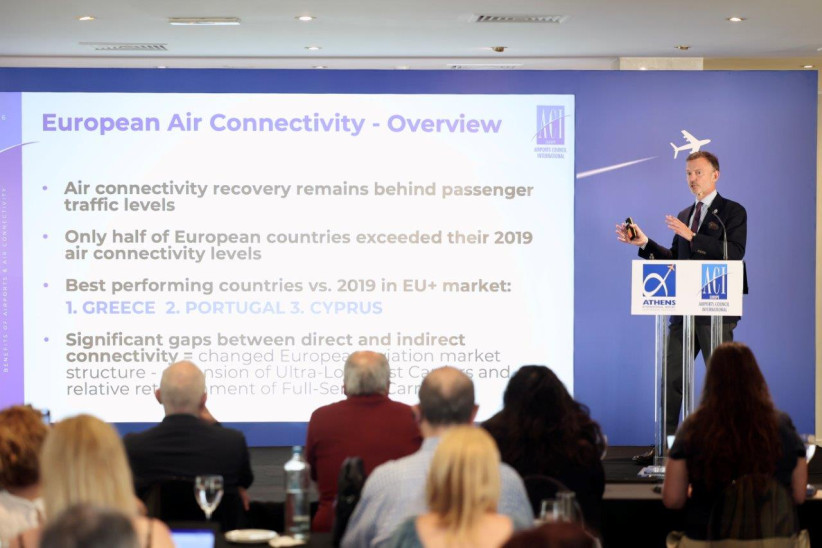Greece conquers Europe’s top to air interconnection, recording the largest increase among the 31 EU member states, according to the findings of the ACI Europe annual report, which was presented in Athens as part of the 35th annual conference of the Organization. Portugal and Cyprus follow in the classification.
Increase in connectivity is +35% compared to 2019 and +10% compared to 2024, boosting Greece’s role as a fixed pillar of the European airline.
Significant is the performance of Athens International Airport (AIA), which exceeds most of Europe’s large airports in the category of 25–40 million passengers a year, with an increase of +33% from 2019 and +13% from 2024.
THE Yiannis Paraschis, CEO (CEO) of AIA, said: ‘The Air interconnection is a presumption of social and economic viability. The high positions of Greece and Athens at the ACI Europe annual report is a proof of durability and good practices that were nationally adopted in the re -launch of the pandemic, as well as the successful timeless cooperation of all public and private sector bodies.
In a period of intense changes, the ability of a country to maintain and expand its international connections is critical. AIA, with a leading European dimension +33% in interconnection compared to 2019, steadily enhances the competitiveness of the Greek economy. The widespread financial contribution of the Athens International Airport is highlighted by the updated IOBE study: 3.8% of GDP, 214,000 jobs, 2.7 billion euros in public revenue.
Behind and beyond these numbers, there is a constant attempt to operate systematically, strategically and consistently as a catalyst for the national economy, steadily strengthening our socio-economic footprint“
Strategic importance of interconnection
During his opening speech at the conference, ACI Europe General Manager Olivier Jankovec underlined the importance of interconnection for the European building:
“Europe urgently needs a new strategy that recognizes air interconnection as a key pillar for its competitiveness, social cohesion and strategic autonomy. Each 10% increase in direct interconnection leads to a 0.5% increase in GDP per capita. Interconnection is not an abstract concept – it produces truly economic and social benefits, reinforces Europe’s position in the world and makes it more resistant to crises“
The Greek case is the most representative example of this model. While passenger traffic in Europe has returned to pre -pandemic levels, interconnection remains a total of 9% lower than 2019. This means that passengers and areas have less choices and limited access to connections.
Greece as a standard for Europe
Greece’s success is not only based on demand but also on strategy: partnerships with airlines, infrastructure expansion and market needs. This coordinated effort confirms that interconnection is a political choice and not a luxury.
ACI Europe recognizes Greece as a “uniquely positioned” country for socio -economic success based on the strengthening of air connectivity. The example of Greece proves that the connection of markets, people and opportunities can be the foundation of sustainable development at national and European level.
In detail, ACI Europe’s annual report on European Interconnection / 2025 Airport Industry Connectivity Report here
Source: Skai
I am Janice Wiggins, and I am an author at News Bulletin 247, and I mostly cover economy news. I have a lot of experience in this field, and I know how to get the information that people need. I am a very reliable source, and I always make sure that my readers can trust me.













